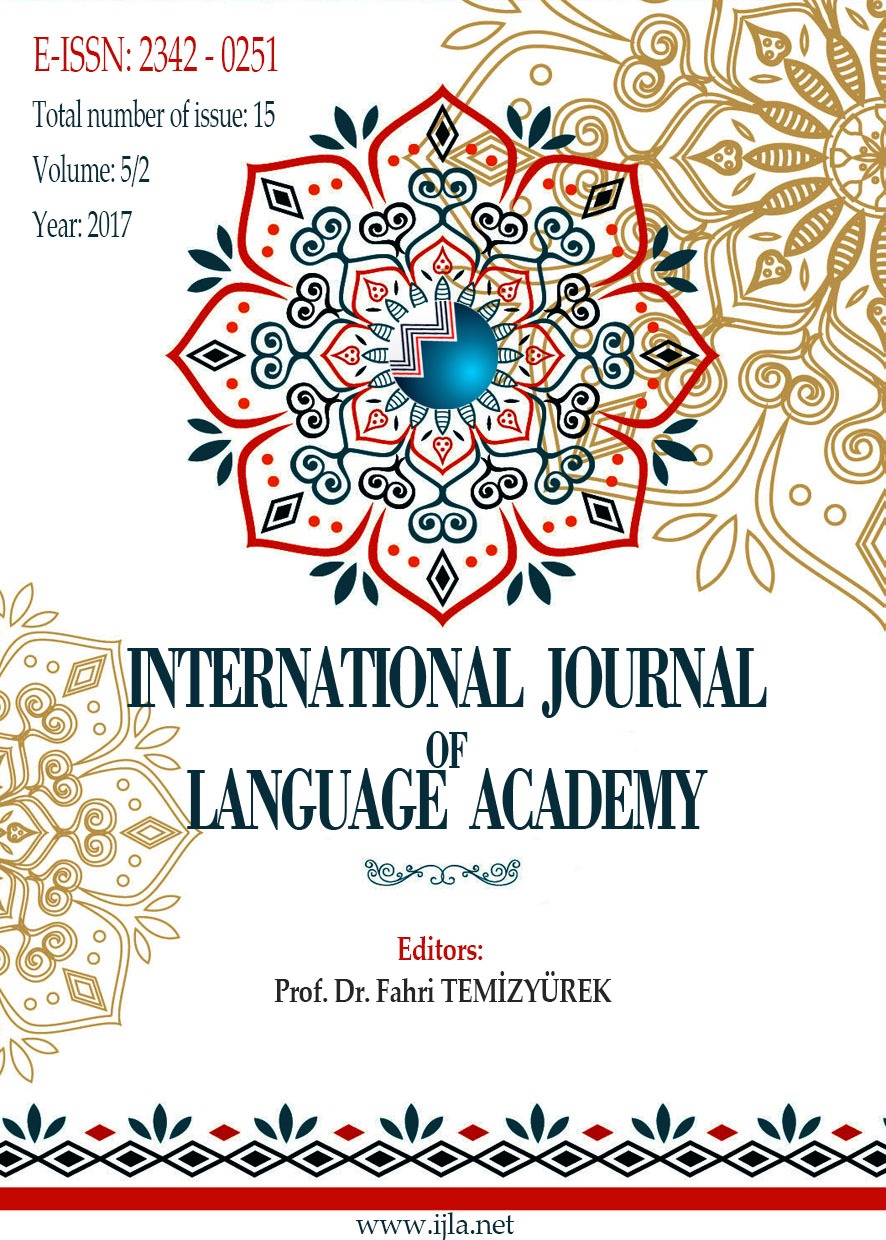Author :
Abstract
Sorgulama, çözümleme, yorumlama, değerlendirme ve karar verme gibi üst düzey düşünme becerilerini kapsayan eleştirel okuma, bilinçli bir yaşama hazırlık aşaması olarak değerlendirilebilir. Çünkü yaşamı anlamlandırma, sorgulama, değerlendirme ve bunun sonucunda bir yargıya varma eğilimde olan bireylerin yolları eleştirel okumayla kesişir. Bu bağlamda, toplumsal gelişime yön veren aktörlerden biri olan öğretmenlerin “eleştirel okuma” kavramına yönelik algıları çok önemlidir. Bu çalışmada Türkçe öğretmeni adaylarının eleştirel okumaya yönelik algıları incelenmiştir. Araştırmada nitel araştırma desenlerinden olgu bilim (fenomenoloji) deseni kullanılmıştır. Araştırmanın çalışma grubunu Adıyaman Üniversitesi Türkçe öğretmenliği 3. sınıfta öğrenim gören 39 öğrenci oluşturmaktadır. Araştırmada verileri elde etmek için yarı yapılandırılmış görüşme tekniği kullanılmıştır. Verilerin analizinde ise içerik analizi yapılmıştır. Araştırma sonucunda, Türkçe öğretmeni adaylarının eleştirel okumanın tanımı ile ilgili önemli bilgilere sahip olduğu fakat olumlu eleştiri konusunda fikir belirtmediği, eleştirel okuma eğitiminde en önemli faktör olarak okuyucuyu gördüğü, eleştirel okuyucunun özellikleri arasında en önemli nitelik olarak tarafsızlık ilkesini belirttiği, eleştirel okumanın öğretilmesi ve geliştirilmesi ile ilgili olarak da özellikle eleştirel okuma yönteminin öğretilmesinin gereğine dikkat çektiği tespit edilmiştir. Elde edilen sonuçlardan hareketle; araştırmaya katılan hiçbir Türkçe öğretmeni adayı tarafından belirtilmeyen olumlu eleştirinin önemine dikkat çekilmesi, eleştirel okumanın geliştirilmesi için öğrencilere yöntem öğretimi hususunda rehberlik çalışmaları yapılması, eleştirel okumayla ilgili disiplinler arası çalışmalarda bulunulması, öğretmen adaylarının müfredatla ilgili görüş belirtmemesi nedeniyle öğretmen adaylarına müfredatta eleştirel okuma becerisinin yeri ve önemi hakkında bilgilendirme yapılması önerilmiştir.
Keywords
Abstract
Critical reading which involves in reasoning, analysing, commenting, evaluating and making decisions can be assessed as a conscious preparation for life. Because the way of the individuals who are in tendency to reason, assess and deduce in their lives coincides with critical reading. In this context, the perceptions of critical reading of teachers who are one of the actors directing social development is too important. In this study, the perceptions of Turkish teacher candidates about critical reading were studied. Phenomenology design, one of the qualitative research methods was used in the study. The study group of the study consists of 39 students studying in the 3rd grade in Teaching Turkish in Adıyaman University. A semi-structured interview form was used in the study to obtain data. A content analysis was conducted in the analysis of the data. At the result of the study, it was detected that Turkish teacher candidates had some information about the description of critical reading, but they didn’t form a view on positive criticism, they regarded the reader as the most crucial factor in learning critical reading, they stated objectivity principle as the most important feature within the characteristics of readers and they determined that in the development and teaching of critical reading, critical reading method should notably be taught. With the obtained results, it was recommended that positive criticism about which none of the Turkish teacher candidates stated should be given importance, a guide work should be performed about the method learning to improve critical reading, multi-disciplinary studies should be carried out about critical reading and since teacher candidates stated no opinion about the curriculum, some briefings should be given to these candidates about the position and importance of critical reading skills.
Keywords
- Akyol, H. (2014). Okuma. Kırkkılıç A ve Akyol H. (Ed.). İlköğretimde Türkçe Öğretimi (15- 48). Ankara: Pegem Akademi.
- Aşılıoğlu, B. (2008). Bilişsel Öğrenmeler İçin Eleştirel Okumanın Önemi ve Onu Geliştirme Yolları. D.Ü.Ziya Gökalp Eğitim Fakültesi Dergisi. 10, 1-11.
- Bayraktar, M. (2012). Şematik Öğrenme Modelinin Eleştirel Okuma Becerisini Geliştirmeye Etkisi. Yüksek Lisans Tezi, Abant İzzet Baysal Üniversitesi Eğitim Bilimleri Enstitüsü, Bolu.
- Çifçi, M. (2006). Eleştirel Okuma. Belleten. 1, 55-80.
- Demirel, Ö. (2011), Yabancı Dil Öğretimi. Ankara: Pegem Akademi.
- Emiroğlu, H. (2014). Eleştirel Okuma Öğretiminin Eleştirel Okuma Becerisine Etkisi. Yüksek Lisans Tezi, Düzce Üniversitesi Sosyal Bilimler Enstitüsü, Düzce.
- Gündüz, O. ve Şimşek, T. (2011). Anlatma Teknikleri I/ Okuma Eğitimi El Kitabı. Ankara: Grafiker Yayınları.
- Karabay, A. (2012). Eleştirel Okuma-Yazma Eğitiminin Türkçe Öğretmeni Adaylarının Akademik Başarılarına ve Eleştirel Okuma-Yazma Düzeylerine Etkisi. Doktora Tezi, Çukurova Üniversitesi Sosyal Bilimler Enstitüsü, Adana.
- Özbay, M. (2014). Anlama Teknikleri I - Okuma Eğitimi. (4.baskı). Ankara: Öncü Kitap.
- Özdemir, E. (2011). Eleştirel Okuma. (8.baskı). Ankara: Bilgi Yayınevi.
- Özmutlu, P., Gürler, İ., Kaymak, H. ve Demir, Ö. (2014). Ortaokul Öğrencilerinin Eleştirel Okuma Becerilerinin Çeşitli Değişkenlere Göre İncelenmesi. Turkish Studies. 9(3), 1121-1133.
- Potur, Ö. (2014). Ortaokul Türkçe Derslerinde Eleştirel Okuryazarlık Eğitimi. Doktora Tezi, Çanakkale Onsekiz Mart Üniversitesi Eğitim Bilimler Enstitüsü, Çanakkale.
- Sadioğlu, Ö. ve Bilgin, B. (2008). İlköğretim Öğrencilerinin Eleştirel Okuma Becerileri ile Cinsiyet ve Anne-Baba Eğitimi Arasındaki İlişki. İlköğretim Online, 7(3), 814-822.
- Sever, S. (2013). Çocuk Edebiyatı ve Okuma Kültürü. (2.baskı). Ankara: Tudem.
- Sönmez, V. ve Alacapınar, F. G. (2014). Örneklendirilmiş Bilimsel Araştırma Yöntemleri. Ankara: Anı Yayıncılık.
- Tosun, M. F. (2014). Ortaokullarda Eleştirel Okuma Eğitiminin Türkçe Öğretmenlerinin Görüşlerine Göre İncelenmesi. Yüksek Lisans Tezi, Dumlupınar Üniversitesi Eğitim Bilimleri Enstitüsü, Kütahya.
- Yıldırım, A. ve Şimşek H. (2013). Sosyal Bilimlerde Nitel Araştırma Yöntemleri. Ankara: Seçkin Yayıncılık.





